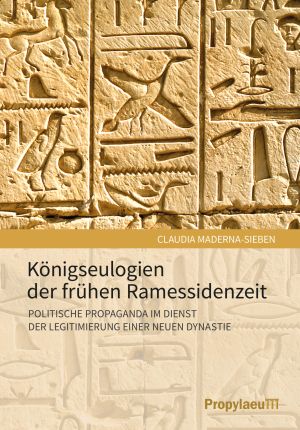
Zitationsvorschlag
Lizenz

Dieses Werk steht unter der Lizenz Creative Commons Namensnennung - Weitergabe unter gleichen Bedingungen 4.0 International.
Identifier
Veröffentlicht
Königseulogien der frühen Ramessidenzeit
Politische Propaganda im Dienst der Legitimierung einer neuen Dynastie
Mit der 19. Dynastie des Neuen Reiches gelangten Herrscher auf den ägyptischen Thron, die keinerlei familiäre Verbindung zur königlichen Familie der 18. Dynastie besaßen. Ramses I., ein hochverdienter Militärbeamter, wurde von Haremhab in einer Zeit zum königlichen Nachfolger eingesetzt, die für die Großmacht Ägypten innen- wie außenpolitisch äußerst brisant war. Innenpolitisch stand Ägypten noch unter dem Einfluss der Thronwirren der Nachamarnazeit, und die Rückkehr zum traditionellen Schema des ägyptischen Königtums war nicht endgültig vollzogen. Außenpolitisch stellte die immer größer werdende Macht der Hethiter eine ernste Bedrohung dar. In diesem Spannungsfeld mussten die ersten Könige der Ramessidenzeit bezüglich ihrer Herrscherlegitimierung neue Strategien entwickeln, konnten sie sich doch nicht auf die Zugehörigkeit zu einer königlichen Dynastie berufen. Für eine Betrachtung der Herrscherrepräsentation der frühen 19. Dynastie bietet das Material der Königseulogien offizieller, von der Staatsführung selbst in Auftrag gegebener Denkmäler einen eindrücklichen Überblick über die textliche Darstellung der ramessidischen Herrscherlegitimation, die im Zusammenspiel mit einem großangelegten Bildprogramm auf eine neue Art und Weise politisch propagiert wurde.






